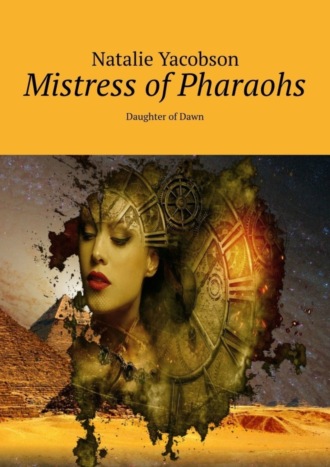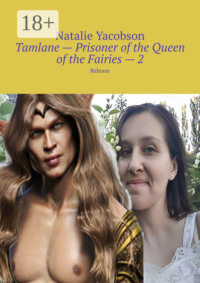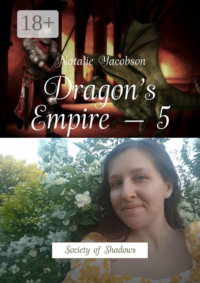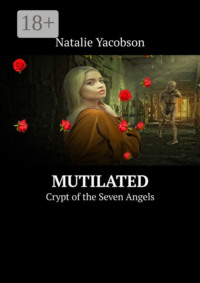
Полная версия
Mistress of Pharaohs. Daughter of Dawn
“I sent helpers to look for him, but they didn’t find anyone. This angel doesn’t seem to be one of your cohorts. Maybe Michael sent him. By the way, you know that Michael has built a huge temple on the border of the Sahara to keep you out of the deserts. For some reason he is very reluctant for you to visit King Menes. Is he jealous, perhaps?”
Remy’s voice became ingratiating. He flew around Alaïs, whispering:
“Imagine: this temple is modeled on the heavenly structures. It is as if it was made of clouds, but the material is strong. It is white stone. My centurions saw Michael hauling the blocks himself. He is sure that this temple will keep you out of Memphis.
“Is it a temple of heaven on earth?” Alais wondered. “It happens! Let’s go see it, and pay King Menes a visit too.”
The Temple of Heaven stood on the border between the desert and the lands beyond. Alais looked upon it as a stronghold of the enemy. It had been built here by her brethren left above. That was why the structure looked so ethereal, even though it consisted of heavy blocks. The white stone was stacked with openwork turrets that jutted into the clouds. Only angels could have built such a structure. To men it would have appeared as a fairy tale. That’s why people didn’t see this temple.
Alais looked up at the heavens. Empty! She heard no more angelic calls to return. Then it was time to conquer the land.
The temple stood as the watchtower of heaven on earth. If it was gone, there would be no control of heaven. Destroy it with fire? The creature sitting on the minaret was in her way. Alais took a closer look at it. It seemed to be limping and dragging a broken wing behind it. The white creature with the broken wings is a cripple! It was put here as atonement for sympathizing with the rebels. Does it still feel such sympathy for her as to yield? It had moved with incredible speed, bypassing the domes and bell towers, it was now hiding behind the lancet window opening, but it still wanted to watch her.
“Fly to me?” Alais beckoned with the tip of her forefinger.
The white creature shook its horned head negatively. It couldn’t fly.
“Then crawl!”
The creature crawled obediently down the wall, scratching the white stone with its long, crooked claws.
“Who left you here to keep watch?” Alais wanted to go toward the crawling creature, but Remy stopped her.
“It’s contagious.”
“Is it even to me?” Alais looked into the creature’s rotten eyes. It really did seem better to stay away from it. It could be bait.
“How many creatures like it are there in this temple?”
“Countless,” Remy counted. He could see through the walls easily.
“It’s not a temple.”
“Then destroy it, mistress. It is within your power.”
“But it is the temple of heaven, and to heaven we have lost.”
“Everything that stands on earth is yours.”
Alais frowned. The temple irritated her greatly. It reeked of Michael’s aura. Surely he had a hand in the construction. The structure combined the features of all the religious buildings in the world. So Remy whispered. He flew over the world, watching people who noticed the higher beings begin to build temples. Such temples were only monuments to incredible encounters between humans and demons or angels, but this one was special. It was not built by humans, but by angels themselves. The unburned angels who remained in heaven were hated by Alais. How dare they build anything on earth!
Alaïs walked forward, treading bare feet on the scorching sand. The fiery sand itself was turning to ash beneath her feet. She couldn’t do that in sandals. A chain of scorched footprints stretched across the sand like a living black snake. Alais didn’t fly, but walked forward, not knowing why. The temple was calling to her as one living organism. This temple was the seal of heaven on earth. With it, the heavens claimed the desert and the earth. It should not be so. This land is hers! And this temple is superfluous.
A voice in the wind that blew suddenly from the minarets warned, but Alais stepped forward.
And the temple collapsed. It was without fire. It was without the use of force. No trickery. It was simply from the fact that she had come close.
Debris fell at her feet. The crushed white creature groaned. Would it die? What difference does it make! The temple is gone. That is, there is no seal of heaven either. Alais clenched the stone wreckage in her fist and crushed it into ashes. The world is at her mercy.
Pharaoh Menes
Tinis was the capital, but the royal residence was not there. Remy reported that Menes deflected the flow of the Nile with a great embankment and erected the fortress of Inebu-hedge on the spoils. It was stunning in its splendor. That’s where it was worth going from the start. The cold celestial temple did not impress in comparison to the architecture of the royal palace. Here Alais had been long awaited. Apparently Menes had warned everyone that a deity would one day come to him.
People who saw her fell to their knees. It even made her feel sorry for them. The nobility and the rabble alike lowered their faces into the road dust as the deity approached. They dared not look up at her. Probably people were afraid of going blind. Alais had noticed that the glow of the sun made human eyes hurt, and she was part of the sun. So the fear of those who encounter her is not surprising.
The king’s palace was not only inhabited by humans. There were dead warriors with red eyes in every dark corner of the palace. Toward Alais stepped the horse Menes had once called Urey. A bracelet in the shape of a snake wrapped in rings ran down its black hoof. Alaïs remembered where the bracelet had come from. She patted Urey’s scruff. The horse’s eyes glittered red, like two large rubies. There was a devilish spirit in the horse’s body.
“Greetings, Urey!” Alais stepped away from the horse. She could fly through the halls of the palace, but she thought it more respectable to walk. Her feet in gilt sandals clattered across the marble floor. Lotuses were in the air. Ponds and pools were full of them. The palms, scattered everywhere, provided pleasant shade.
Alais passed gardens, baths, and lavishly furnished halls. There were many servants and lords everywhere. But where was the Pharaoh himself? Where was Menes? He was not in the king’s bedchamber. The great bed stood empty.
“It’s daytime,” Remy realized as he flew in from above. “People don’t sleep during the day, they go about their business. Pharaoh must be in the throne room. It’s somewhere over there.”
Alais felt nostalgic. There was a throne in heaven too, and that throne didn’t go to her. It was all Michael’s fault. She hoped he was now weeping fiery tears over the wreckage of his temple.
Menes was well established in Memphis. The city was indeed white, as the name communicated. Even the royal palace was built entirely of white stone. In hot climates white is practical because it does not heat up as much in the sun as materials of all other colors. But that’s not why Menes chose white. The white stone had gold ornaments embedded in it everywhere. Apparently, this combination reminded the king of a deity he had once met in the desert that had helped him win. Alais knew perfectly well that people think of angels as being composed of two colors: white and gold. No matter how she looked, she still retained her angelic appearance. Pharaoh Menes did not discern the darkness that enveloped the angelic silhouette. Had he decided that Alais was a good deity? Could he have been deluded at the sight of her beautiful appearance as to decide that a good deity was capable of raising dead armies from death?
People exhibit mental blindness at the sight of the beauty of angels. Rumors reached Alais that Michael was fooling the heads of mortals to use them as his puppets. She appeared in Memphis to put an end to this. From now on, humans are just her puppets. It is everyone, starting with Menes.
Menes founded a kind of cult of worship in his palace for the deity he once met. The wall paintings vividly displayed the story of how the pharaoh had met a deity in the desert. Alais could hardly recognize herself in the drawings. Human artists could not convey angelic beauty as well as human sculptors. The golden statue in the niche looked only roughly like Alais. Bundles of flowers were fragrant at its foot. Some worshippers were already praying to her. The appearance of the living deity came as a shock to all.
Listening to people’s thoughts, Alais learned that Menes had declared himself a living deity as well, and that all future pharaohs should be worshipped as gods as well. Apparently, the treaty with Alais had had this effect on him. Menes decided that by accepting help from the deity he himself had become related to the gods.
The dead serpent crushed by Urey also became part of the king’s symbolism. Now Urey was a wreath in the form of a serpent, which the pharaoh himself wore.
Menes was waiting for her. Alais sensed that he was counting the minutes until she arrived. His heart was beating like a caged bird. Why does people’s heart beat so hard when they want to behold a deity? Alais always kept her cool, even as she flew into battle in the heavens. Today, for the first time, she was nervous. The image of the handsome, swarthy warrior who had lost his army did not leave her memory. Now she would see him again. Only now he is not a wanderer, but a pharaoh. She cannot bestow upon him more than she has already bestowed upon him. You could say she put him on the throne. Angels are not supposed to share their power and authority with anyone, but she did. She went against heaven again. Pharaoh is her proxy.
The doors of the throne room swung open before her. Fanciful ornamentation on the doors repeated the story of how a destitute pharaoh had actually been adopted by a desert deity. Now all pharaohs are considered children of the gods.
Alais entered the throne room and was embarrassed for the first time. Instead of the handsome young man she remembered, some old man sat on the throne. The luxurious pectoral, Urey, and wig could not hide his ugliness. It wasn’t Menes! Alais recoiled from the insignificant man who happily extended his arms toward her. This is some kind of impostor. There are wrinkles stretching across his skin. He is not attractive at all. Jewelry is the only attractive thing about him. And then there are the eyes! Alais was stunned to notice Menes’ beaming eyes on his wrinkled face.
So this really is him? But why had he changed so much? What had happened to him? Was it Michael’s jokes? Did he take away Pharaoh’s beauty so there would be no one to be jealous of?
Menes sent away the slaves with their lampshades and the courtiers who had brought some reports. He wanted to be alone with the deity.
Alais’s first impulse was to fly away from here, winging away. The changed Menes was her first great shock since she’d fallen to earth.
“Didn’t you know, mistress?” Remy held her back. “People get old!”
“Are they aging?” Alais didn’t understand what the word meant. It had never been applied to angels. “What do you mean, they grow old?”
“Time breaks down human bodies,” Remy began to explain patiently. “The longer people live, the more their physical makeup deteriorates. The skin dries and wrinkles, the body becomes weak – this is called old age. There is no such process with angels.”
“Has anyone tried to reverse the process?”
“It can’t be reversed, it can only be completed. It usually ends in death. Once a person is too old, he dies. But Menes isn’t too old,” Remy hovered like a blob of darkness over Alais’s shoulder, whispering in her ear. “Pharaoh is sixty years old, if I’m not mistaken. It is not yet the latest phase of old age. But you have come just in time to see the ruler alive.”
Alais didn’t listen to him anymore. It turns out that people are even more fragile than she thought they were. Such a concept as aging shocked her. Angels didn’t grow old even after hundreds of thousands of years, but humans take half a century to shrivel up and turn into living relics. How awful!
So the beautiful warrior with the blue-black hair will never come back to her again. Menes is here, near, and at the same time he is gone. There is an old man on the throne.
Overcome with disgust, Alais walked over to him, leaned over the throne, and hugged him lightly.
“I have come to take what I promised,” she whispered. “From now on you and all your descendants serve me!”
Pharaoh said nothing against her. He had no intention of bargaining from the start.
“Does this mean you’ll never leave me again?” He said, almost triumphantly.
“Yes it does,” he nodded, “but perhaps you won’t be happy about it.”
The beginning of the reign
She was wrong. Menes had many problems that only a god could solve.
“I have long been planning to build you a temple in the middle of the desert, but I cannot find the place where we first met,” Pharaoh said. “The temple must stand there, and the pilgrims must come to it in droves with gifts and petitions.”
Such pomp was not part of Alaïs plans. Why would she want a temple in the middle of the wilderness and crowds of worshippers?
“Let’s leave it for later.”
“It would be too late for me.”
Alais glanced at Menes’ wrinkled hand touching her shoulder. Indeed, he’s running out of time. His body is deteriorating. Old age is taking its toll. It’s a good thing angels don’t age. Though can’t the way they are burned be compared to old age?
At the thought of those mutilated wingless angels still crawling in the deserts and eating lizards, Alais felt sick. How is it that she feels the pain of her legion as if it were her own? Why had her all-encompassing love for the angels only awakened in her when they found themselves defeated and mutilated? Is this nonsense? Or is it punishment for rebellion? Love is like a knife in the heart.
Her feelings for Menes also began to awaken gradually. He proved to be clever. Alais began to respect him. Would he be gone in a couple of decades?
Menes didn’t think of himself as old. He was still out hunting. He seemed to love hunting hippos. She guessed it’s not hard to hunt with an entourage. The aged Pharaoh’s body was still mighty, but it was no longer beautiful.
As a member of the angelic race, Alais valued beauty above all else. The strong feelings awakened to the mutilated creatures struck her herself. She now knew that old age disfigured humans no less than heavenly fire had disfigured her angels.
Could Menes be made young again? And why would she need to? Just to have a servant who is pleasant to look at? In fact, Pharaoh had become her servant. Menes was well aware that if he disobeyed the deity in any way, the deity would crush all of Memphis.
Alais clearly showed that she could breathe fire and crush an entire fortress in a fraction of a second. The demonstration of power was unnecessary. Pharaoh remembered that she could raise a whole army from death. He was far more impressed by the resurrection of the dead than by her ability to spew fire and destruction from her lips.
“I can destroy an entire nation of your enemies in one hour,” she boasted. That wasn’t an exaggeration of her abilities. She could fly over a city and destroy it, and it would be reduced to mere rubble. Angels can do anything!
“Can you raise me from my deathbed?”
“Do you die?”
The question took Pharaoh by surprise.
“Everyone dies sometime.”
“None of my servants has ever died permanently.”
“Then I would like to be your servant!”
Menes almost fell over when the tip of Alais’ wing grazed his shoulder. The wings of angels are powerful, but humans are too weak. We must behave more carefully in the presence of Pharaoh. Alais folded her wings behind her back.
“Could you bring me back to life the way you brought my warriors back to life?”
What a tricky question! Alais turned away. Should she confess the truth to him?
“So what is it?” Menes worriedly waited for an answer. “Have your powers not waned since you raised my troops from the ashes? Or is it harder to bring a Pharaoh back to life than it is to raise the warriors?”
“No, it’s easy, but…” Alaïs hesitated for a moment, then she decided to come clean. “I can raise your body from its deathbed. It would move and speak, even make intrigues and amaze others with its wisdom, but it would no longer be you. Inside your body will dwell another… one of my spirits.”
For a minute Pharaoh didn’t want to believe her.
“Look at your warriors!” Alais led Menes to the window. “Do you recognize them? They have become incredibly strong and bloodthirsty. They no longer need food, they write hieroglyphics on the ground and walls with their blood, and they know secrets people don’t normally know. Were your warriors like this before? It’s still their bodies, but the mind inside is different. Their flesh rots and stinks, which is why so much incense is smoked around them, to ward off the stench of decay. Your warriors live, but they decompose. Once their bodies are rotted away, the alien spirit will fly away, and you will be without an army. But I can make you a new one if you give me new human bodies. My spirits need somewhere to live.”
“Apparently, the bodies of ordinary soldiers are not a valuable enough vessel for spirits to inhabit. Maybe a pharaoh’s body would suit them better.”
“I don’t know, I haven’t checked.”
Alais doubted that her spirits would treat soldiers and kings differently, but she decided not to disappoint Menes. Pharaoh wanted to nurture hope.
“Would you like to go hunting with me in Shedet?” He suddenly suggested.
“What’s so special about Shedet that you would offer a glimpse of it to a deity?” All Alais knew was that the Libyan desert stretches around the oasis where Shedet is located. She herself rarely flew there, but her servants lived near the city.
“The best waterfalls and Lake Mer-ur are there.”
“Are there plenty of crocodiles there?” Alais remembered that one of her demons, who loved to subdue reptiles, had settled there.
“There are also hippos there. Do you know how much fun it is to hunt them?”
“I prefer to hunt humans,” Alais said. Menes might have thought it an insult, but he didn’t.
“Hunting humans is called war,” he said from his own experience.
“It is not always.”
Alais had a different experience. After the war in the sky, there was a long hunt on earth to survive. One demon, whose name was Sokar, caught travelers in the desert and skinned them alive so he could wrap it around his burns like bandages. It made him look like a living mummy. As far as Alaïs had learned from Menes, it was in honor of Sokar that the Egyptians began to make mummies out of the dead. The demon had taught them something. And Sokar was now revered as the god of the dead and of necropolises. It was quite his path. Alais herself would have called him the god of death, but strangely enough, in addition to his grim merits, he was also revered as a god of fertility. Apparently, the corpses he left behind served as excellent fertilizer for the land. Alais had noticed that the earth, on which her angels had fallen, greedily fed on all the remains of life.
Конец ознакомительного фрагмента.
Текст предоставлен ООО «Литрес».
Прочитайте эту книгу целиком, купив полную легальную версию на Литрес.
Безопасно оплатить книгу можно банковской картой Visa, MasterCard, Maestro, со счета мобильного телефона, с платежного терминала, в салоне МТС или Связной, через PayPal, WebMoney, Яндекс.Деньги, QIWI Кошелек, бонусными картами или другим удобным Вам способом.









